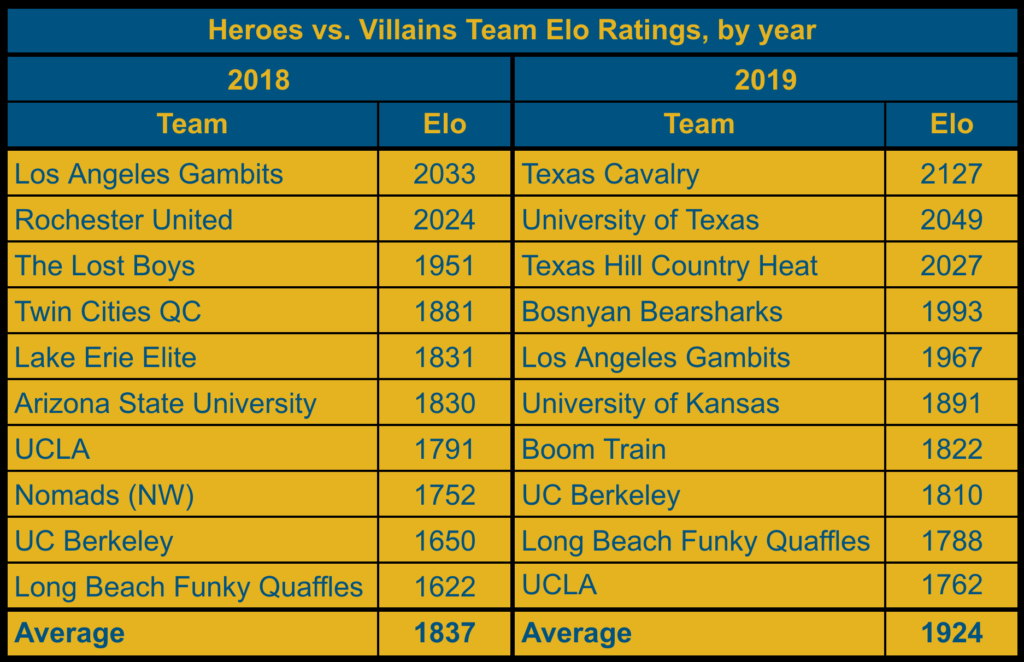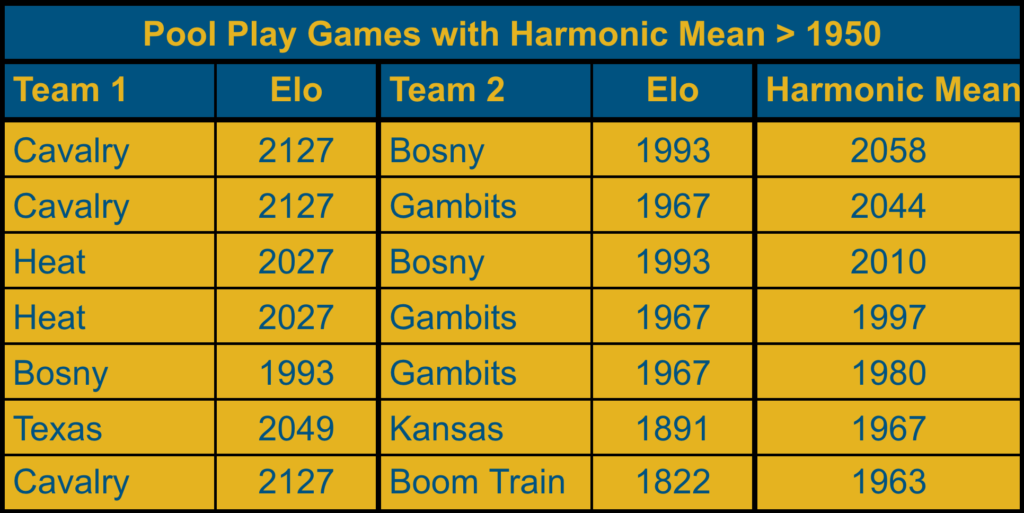Antwerp QC, Much of Belgian Core, Leaves Competitive Quidditch
For the second year in a row, the best of the best are packing their bags and flying to the West Coast for the most exclusive tournament in USQ history. Last year, we wrote that the Heroes vs. Villains Invitational was, in all likelihood, the highest-caliber tournament of its size–based on average quality of team–to have ever occurred. This year, the tournament will, without a doubt, earn that honor again, dethroning its 2018 iteration for the title of most-competitive tournament ever.

When adjusted to our modern Elo algorithm, the average team Elo rating at last year’s invitational sat at 1837. This year’s tournament’s average blows that out of the water, featuring teams whose average Elo rating is 1924–a rating only currently surpassed by 10 teams in the country. Last year’s nationals, despite bringing every top team in the country, had an average team-Elo rating of 1660. While this year’s invitational will not feature every potential contender for the national title, it still boasts five of the top 10 teams in the country, including Elo’s No. 1 overall Texas Cavalry and No. 1 college University of Texas.

Of the 18 scheduled pool play games, seven of these games feature a harmonic mean* Elo rating of greater than 1950. To put that number in context, last year’s 87-team nationals featured only 12 games of that caliber, scattered throughout the 184 total pool or flight games played there. The seven aforementioned games are as follows:
Generally “invitational”-named event in quidditch often lack the prestige or relevance to be able to attract such a high caliber of teams, or the selectivity to ensure their concentration, but this year’s Heroes vs. Villains Invitational is able to live up to its name (specifically, the invitational part of it) by attracting the highest caliber grouping of teams we have ever seen. Those who claim that Nationals could be more successful as a more selective event should narrow their focus on Heroes vs. Villains, and whether after a bumpy start in its first year, it can continue to build on its prestige as the highest-caliber tournament in the sport.
*Harmonic means are used to control for the higher team’s Elo bringing the average up by too much; the closer two team’s Elo ratings are, the more their harmonic mean will approach their true average
Featured photo by Samanda Sweet
Archives by Month:
- May 2023
- April 2023
- April 2022
- January 2021
- October 2020
- September 2020
- July 2020
- May 2020
- April 2020
- March 2020
- February 2020
- January 2020
- December 2019
- November 2019
- October 2019
- August 2019
- April 2019
- March 2019
- February 2019
- January 2019
- November 2018
- October 2018
- September 2018
- August 2018
- July 2018
- June 2018
- April 2018
- March 2018
- February 2018
- January 2018
- November 2017
- October 2017
- July 2017
- June 2017
- May 2017
- April 2017
- March 2017
- February 2017
- January 2017
- December 2016
- November 2016
- October 2016
- September 2016
- August 2016
- July 2016
- June 2016
- May 2016
- April 2016
- March 2016
- February 2016
- January 2016
- December 2015
- November 2015
- October 2015
- September 2015
- August 2015
- July 2015
- June 2015
- May 2015
- April 2015
- March 2015
- February 2015
- January 2015
- December 2014
- November 2014
- October 2014
- September 2014
- August 2014
- July 2014
- May 2014
- April 2014
- March 2014
- February 2014
- January 2014
- November 2013
- October 2013
- September 2013
- August 2013
- July 2013
- June 2013
- May 2013
- April 2013
- March 2013
- February 2013
- January 2013
- December 2012
- November 2012
- October 2012
Archives by Subject:
- Categories
- Awards
- College/Community Split
- Column
- Community Teams
- Countdown to Columbia
- DIY
- Drills
- Elo Rankings
- Fantasy Fantasy Tournaments
- Game & Tournament Reports
- General
- History Of
- International
- IQA World Cup
- Major League Quidditch
- March Madness
- Matches of the Decade
- Monday Water Cooler
- News
- Positional Strategy
- Press Release
- Profiles
- Quidditch Australia
- Rankings Wrap-Up
- Referees
- Rock Hill Roll Call
- Rules and Policy
- Statistic
- Strategy
- Team Management
- Team USA
- The Pitch
- The Quidditch Lens
- Top 10 College
- Top 10 Community
- Top 20
- Uncategorized
- US Quarantine Cup
- US Quidditch Cup
